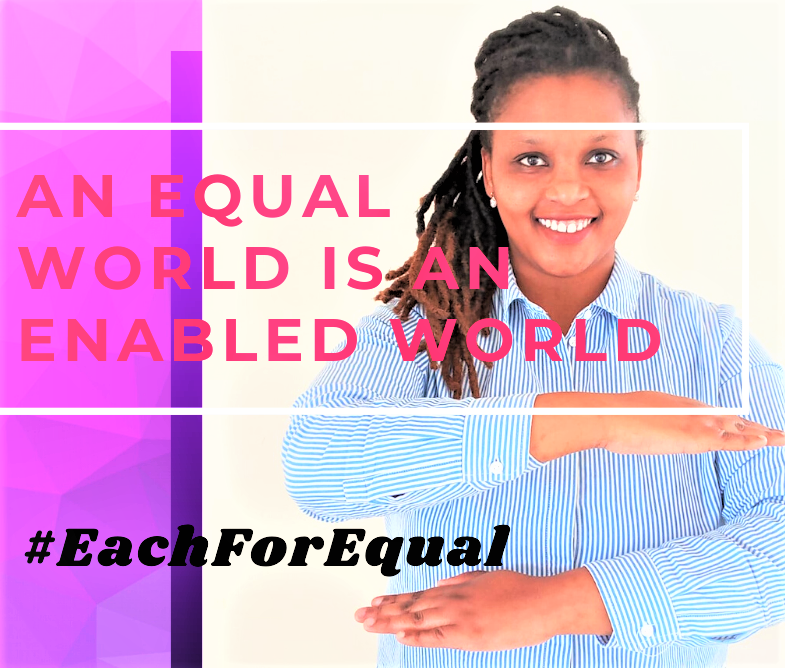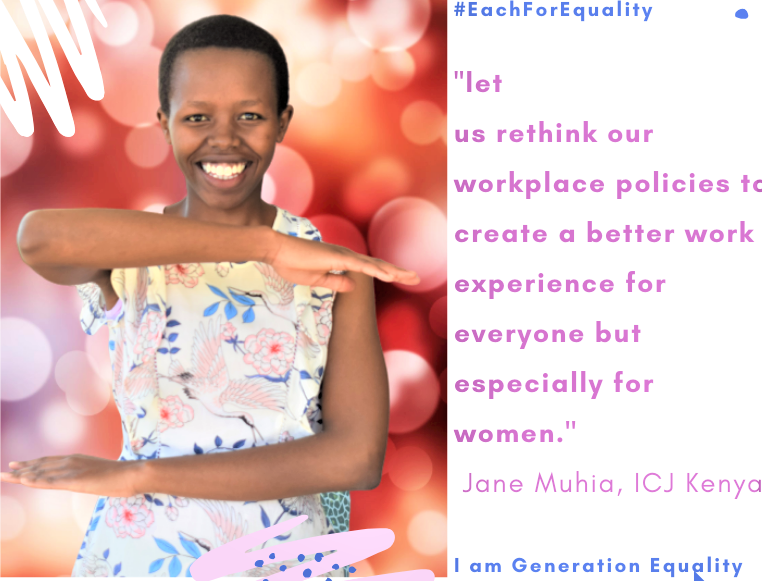Tina Alai
Looking beyond the law: shared national values must be at the heart of the fight against gender-based violence
Today, it may be difficult to fathom the existence of a world where only boys and men are permitted to pursue education, vote or participate in political affairs, own property, pass on citizenship to their children and spouses, or aspire for professional positions. Yet, only a few decades ago, this was the reality. Since the 18th century, women and feminist movements around the world have been agitating for the dismantling of social constructions, discriminatory practices and stereotypes, that perceive and treat women and girls as inferior to their male counterparts. Thus, annually, 8th March is commemorated worldwide as the International Women’s Day, to take stock of and celebrate the milestones that have been realized towards achievement of gender equality.
In Kenya, we celebrate the promulgation of the 2010 Constitution that provides enhanced legal protection of women and girls’ equal rights to: education; property (including matrimonial property); family and protection in marriage; positive culture; bodily integrity and autonomy (including protection against violence in the public and private spheres); political participation; citizenship; employment and favorable work conditions, including during pregnancy and equal pay for equal work; professional and scientific development; and, sexual and reproductive health, among other social, political and economic interests.
The current Constitutional dispensation may imply that the agitation for women’s empowerment and gender equality in Kenya should now be consigned to the past. However, beneath the Constitutional, legal and policy aspirations, lies a difficult reality to contend with – there has been progress, but we are yet to achieve meaningful social, economic, cultural and political transformation that can catalyze, sustain and propagate equal protection and enjoyment of human rights by women, girls, men and boys alike. The enactment of laws is a first and important step in recognition of society’s acceptance to be guided by the values of gender equality and non-discrimination. However, the full effect of these principles, standards and values, as articulated in our laws, can only be achieved through a substantial shift in negative societal practices, attitudes, beliefs, stereotypes and biases on gender, to enable effective implementation and enforcement of the law.
Gender-Based Violence: A Depiction of Persisting Gender Inequalities
The persistent and soaring crisis of gender-based violence (GBV) against women and girls manifestly depicts part of the work that remains to be completed toward realization of gender equality. Varied studies advanced by historians, feminists and other scholars have established that violence against women is predominantly rooted in harmful gender constructions that position men as being superior to women. The superiority of men is perceived to permit them to dominate over and control all aspects of women’s lives, including their sexuality and reproduction. Thus, violence against women and girls, it may be argued, has been accepted as a normal expression of masculinity.
A lobby group, Counting Dead Women in Kenya, documented at least 94 cases of femicide (killing of women and girls) in 2019, with 14% of the victims having been raped prior to murder. This translates to the killing of at least 1 woman or girl per week in Kenya in 2019. This is the only dedicated study, so far, undertaken to document cases of femicide in Kenya, also recognising an additional component of sexual violence committed prior to the murders. Comprehensive tracking and data collection on femicide in the coming years, as well as sexual violence connected to femicide, may reveal a higher prevalence. The Kenya National Police Service’s most recent Annual Crime statistics reported 148 cases of domestic violence and 6,804 cases of rape, incest and defilement in 2018. Notably, incest cases went up by 49.8%, defilement by 35.7% and rape by 19.8% in 2018 compared to 2017. Unfortunately, the crime reports are not disaggregated by sex or gender. However, media and other reports indicate that while there are incidences of GBV against men and boys, women and girls are manifestly disproportionately affected. Further, in many of the incidences targeting men and boys the underlying causes are often linked to perpetrators’ desire to “feminize” the victims, thereby drawing from the same gender stereotypes that fuel GBV against women and girls.
It should also be noted that the experiences of GBV by certain groups of women and girls are compounded due to intersecting forms of vulnerability, marginalization or discrimination such as ethnicity, socio-economic status or disability. A case in point is the use of GBV as a weapon to terrorize opposing ethnic communities, especially in informal settlements, during elections. At least 900 cases were documented during the 2007-08 post-election violence period and 201 cases in the 2017 election period. In both cases, women were the most affected and constituted 96.2% of the reported cases in 2017.
Therefore, GBV against women and girls in Kenya endures despite the existence of Constitutional protections against discrimination, all forms of violence and torture, cruel, inhumane or degrading treatment, as contained in the Bill of Rights. Subsidiary laws provide further protection and criminal penalties against GBV, including the Penal Code, Sexual Offences Act (2006) and the Protection against Domestic Violence Act (2015). The question that begs, therefore, is where is the disconnect? Why does GBV continue to occur at such an alarming rate within an otherwise veritable legal and protection framework?
The response (or lack of it) by the Kenyan populace to the astounding number of reported GBV cases depicts a worrying trend – collective silence, normalization, trivialization and neglect. We have otherwise demonstrated, as a citizenry, that we have the capacity to express our collective anger whenever it is necessary to do so; for instance, against corruption and corrupt leaders. But why is it that daily media reports of incest against young girls (and boys), teenage pregnancies, horrific domestic violence, and brutal rape and murder of women has not elicited collective outrage from Kenyans? The reported cases are staggering, yet, only a tip of the iceberg, as many survivors fear to come forward due to numerous factors, including, potential stigmatization from their own families and communities, or fear of reprisals. A recent study conducted by Physicians for Human Rights, UN Women and the UN Office of the High Commissioner for Human Rights, Breaking Cycles of Violence: Gaps in Prevention of and Response to Electoral-Related Sexual Violence, demonstrates that those who dare to tell their stories or lodge complaints are often faced with threats, lack of protective measures and support systems, and a biased institutional and criminal justice system that condemns, blames and vilifies the victims. In many cases, poor collection, preservation and documentation of evidence results in failed criminal prosecutions, with numerous perpetrators walking scot free.
The silence, tolerance, trivialization and neglect surrounding GBV and the discriminatory practices and beliefs that fuel it have been rejected in Article 10 of the Constitution, which espouses Kenya’s national values and ethos. The Constitution articulates the centrality and importance of observance, respect, protection, promotion and fulfilment of human rights, human dignity, equity, social justice, inclusiveness, equality, non-discrimination, protection of the marginalised and accountability. These national values and principles should not only be deemed to apply in governance, but must also be reflected as shared values and aspirations of the Kenyan people.
As we commemorate this year’s International Women’s Day (IWD), it behooves us as a nation to interrogate the extent of our investment towards meaningful cultivation of gender equality as part of our shared national values and ethos. Remarkably, several countries around the world commemorate IWD as a national holiday; this could be one way through which the state demonstrates its leadership in instilling the principles of gender equality in the conduct of our national affairs. Further, the state must deliberately identify and invest in effective strategies to dismantle entrenched beliefs, stereotypes and practices that fuel GBV and other forms of discrimination, including through the education curriculum and providing teachers with competency-based training required to deliver the promise of changing attitudes and practices through education. In addition, and of much importance, each of us, men and women, regardless of profession or religion, should take up the responsibility to champion and model equality in public and private spaces. We must be at the forefront in condemning GBV and all other forms of gender discrimination. The time is rife for the political leadership to acknowledge and declare GBV as the national crisis that it is, and ensure concerted efforts and resources to end it, in all its forms.
Christine Alai is an accomplished human rights lawyer with extensive experience and expertise on the advancement of equality, non-discrimination and access to justice for gross human rights violations. Alai has dedicated her career to promoting the protection of women and girls from sexual and gender-based violations, especially in conflict and post-conflict situations. She is an author and co-author of several articles and publications on transitional justice, survivor-centered prevention, accountability and reparation for conflict-related sexual and gender-based violations. Alai has provided leadership in conceptualizing and strategically advancing the vision of reputable national and international human rights organizations. Alai holds a Master of Laws Degree (LL.M.) in International Legal Studies from Georgetown University and Bachelor of Laws Degree (LL.B.) from the University of Nairobi.










